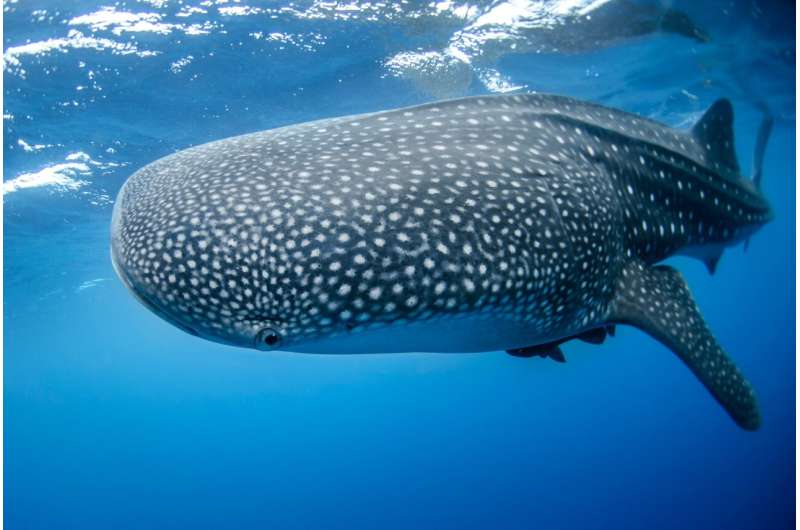Whale sharks found to slow down to allow researchers to scrape off parasites

A trio of marine biologists from The University of Western Australia has found that some whale sharks will slow their swimming to allow researchers to scrape collections of copepods from sensitive areas. In their study, reported in the journal Fishes, Brendon Osorio, Grzegorz Skrzypek and Mark Meekan noticed that in recent years, whale sharks have become more cooperative as researchers attempt to collect parasite samples.
Marine scientists have been collecting skin and/or parasite samples from whale sharks for many years. The sharks represent the largest known living fish and the largest living nonmammalian vertebrate. They are sharks, not whales, and got their name due to their large size—the largest confirmed size is 18.8 meters in length. The sharks are filter feeders and thus pose little risk of biting. Their large size, however, poses a risk of injury to other creatures that venture too close. Scientists study them to learn more about them and the environment in which they live—the open sea.
The researchers have been studying the sharks for nearly a decade, collecting samples of skin and tissue samples to learn more about what the sharks might be eating and how deep they dive. In more recent years, they found they could get roughly the same data by collecting copepods (a type of small parasitic crustacean) that adhere to the skin of the sharks. They also noted that suckerfish, which cling to the sharks, do so as a means to eat the copepods—but tend only to clear copepods on flat, easy-to-reach parts of the skin. The copepods clinging to areas around the mouth and fins are left intact. For that reason, the researchers began targeting those areas using a small plastic knife to remove and bag the parasites.
As time passed, the researchers gathered samples from the same shark more than once, and the sharks seemed to remember the encounters fondly—they began slowing their swimming rate when the researchers approached, and in some cases, stopped swimming altogether, making it easier for the researchers to do their work. They suggest that removal of the parasites reduces irritation and makes swimming more efficient.
More information:
Brendon James Osorio et al, Parasitic Copepods as Biochemical Tracers of Foraging Patterns and Dietary Shifts in Whale Sharks (Rhincodon typus Smith, 1828), Fishes (2023). DOI: 10.3390/fishes8050261
© 2023 Science X Network
Citation:
Whale sharks found to slow down to allow researchers to scrape off parasites (2023, May 16)
retrieved 16 May 2023
from https://phys.org/news/2023-05-whale-sharks-parasites.html
This document is subject to copyright. Apart from any fair dealing for the purpose of private study or research, no
part may be reproduced without the written permission. The content is provided for information purposes only.
For all the latest Science News Click Here
For the latest news and updates, follow us on Google News.

